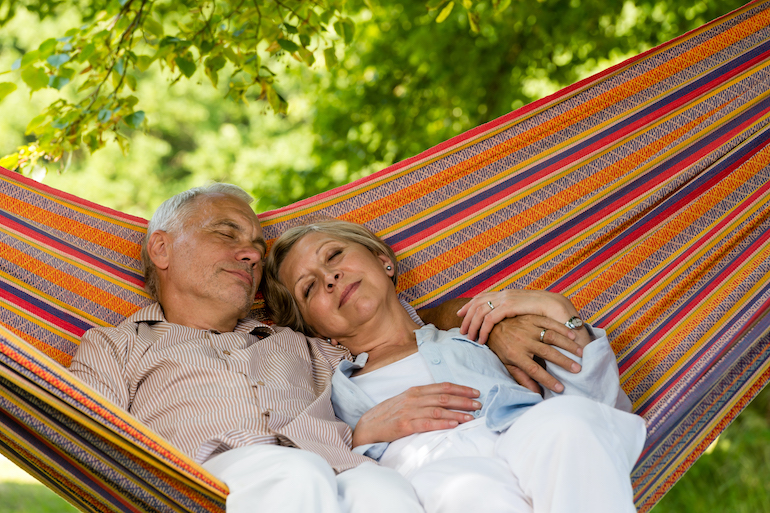
The summer is one of the most anticipated seasons of the year, and even though the current pandemic has caused this year’s summer to look different, there are still things to look forward to, like warmer weather and longer days. One challenge of the season for many people, however, is a lack of quality sleep, largely due to hotter temperatures. Why is this the case? And is there any way to combat it?
Why It’s Harder to Get Good Sleep in the Summer
The Heat
While we are good at regulating our internal temperature (a process called thermoregulation), we are still affected by ambient temperature, or the temperature of the surrounding environment. Our body temperature naturally dips in the evening to prepare for sleep, and hot summertime temperatures make it harder for our bodies to cool down to get ready for rest.
Among elderly people, the effects of atypically warm nights are more significant than that of the general population. As we age, the body becomes less capable of proper thermoregulation, which may make older adults more susceptible to the effects of ambient temperature on their sleep.
So, What Can We Do?
Replace any bulky winter sheets and blankets with lightweight ones (bamboo, microfiber, and lightweight cotton are good options). Additionally, wear lightweight pajamas — or, opt for sleeping in the nude! This practice has many benefits, including lowering blood pressure, increasing sperm count for men, and decreasing the risk of yeast infections for women.
Another strategy is to take a bath or warm shower an hour or two before bed. Timing is important because the hot bath will raise your core body temperature, so soaking too close to bedtime may actually make sleep issues worse. But, if you wait an hour or two, your body will naturally cool back down — and remember how your body naturally cools itself to prepare for sleep? Cooling down from the bath aids this process, helping you fall asleep quicker.
Longer Daylight Hours
Days are longer in the summer, affecting our circadian rhythm, or the body’s internal clock. Light stimulus delays the release of melatonin, which is activated when it’s dark outside. Accordingly, the longer days can make our body and brain stay active longer, making it harder to fall asleep at night.
So, What Can We Do?
Remain physically and mentally active throughout the day to tire yourself out, exercising every day if possible. When inside in the late afternoon and evening, close the blinds to block sunlight, and reduce the amount of artificial indoor light, as well.
Try also to avoid screens. The blue light emitted by screens can keep you awake and compound circadian rhythm disruptions. Ideally, turn off all TV, laptop, tablet, and phone screens at least one hour before bed.
Social Schedules
While this year’s pandemic has caused everyone’s social calendars to look a little different, there are still plenty of opportunities to have some fun and connect with other people, whether it’s through a socially-distanced evening hike or a Zoom happy hour on the front porch. But social settings that keep you active late into the evening can mess with your sleep, no matter where they happen. Exercise, in particular, raises body temperature, increases heart rate, and boosts adrenaline levels — great for a workout but not for hitting the hay.
So, What Can We Do?
Try to stick to a consistent sleep schedule. While it may be tempting to stay up later than normal in the summer, it’s very important to maintain a consistent sleep routine, even on the weekends. Many people are in chronic “sleep debt” from inconsistent sleep patterns without even realizing it, and fixing that debt, while it can take some time, will have massive benefits for your long-term emotional, physical, and mental health.
A few other tips are to try not to exercise or take part in physical activity at least one hour before bedtime and avoid drinking alcohol an hour or two before bed. Alcohol is terrible for sleep quality — as a depressant, it does help you fall asleep faster, but it negatively affects sleep cycles and will make any sleep-related breathing disorders much worse. If you do plan on drinking, make sure you don’t overdo it, and don’t have your last sip as your head is hitting the pillow!
What to Do When the Season Isn’t the Problem
Of course, in many cases, not all of a person’s sleep woes can be blamed on the season. If you or someone you care about is always tired, snores frequently, and usually wakes up with a sore throat or headache, then sleep apnea may be causing the problem. No amount of good habits can overcome this condition—the only viable option is professional help, which you’ll find here at Sleep Better Georgia. Dr. Jeff Rodgers, a dental sleep medicine practitioner with over 20 years of experience, can screen you or your loved one for sleep apnea, and if needed, provide an oral appliance to promote deep, restful sleep at any time of the year. To schedule a free consultation, click here.
